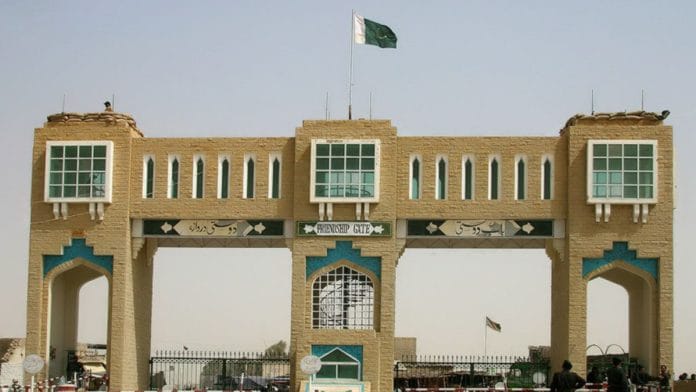New Delhi: Pakistan’s Chaman, located on its border with Afghanistan, was a trade route for the Pakhtuns for generations. Residents on both sides shared families, cultures, trade, mosques and even graveyards, until October last year when movement abruptly stopped.
The cross-border visa restrictions left the local population grappling for resources and led to a severe economic collapse in the Chaman region. They held a nine-month-long sit-in, which ended in July when they were promised change. Now with no sign of action, they have resumed protests.
1.2 million Pakhtuns have been cut off from families and livelihood without any alternative for the first time in over 100 years. “For them, this is not just a piece of land…it is their blood and family,” Kashif Panezai, the vice chairperson of the Human Rights Commission of Pakistan (HRCP), had told Dawn in April this year after 180 days of protest.
Also read: Pakistani businesses don’t like tax compliance. Tajir Dost Scheme faces massive protests
Timeline of protests
Since the new regulations took effect, Chaman has become a hotbed of protests.
The Durand Line, drawn in 1893 by the British, splits the Pashtun region between Afghanistan and Pakistan, dividing tribes and families who historically lived as one. Despite this border, extended families continued to engage in daily life across both sides.
Tensions rose after the US invasion of Afghanistan in 2001, leading Pakistan to tighten border controls, including building a formal border landmark, the Friendship Gate, in Chaman, restricting crossings, and erecting a border fence in 2017.
Throughout all this, residents only needed their national identity cards to cross the Durand Line into Afghanistan’s Spin Boldak. Then on 31 October 2023, Pakistani authorities mandated the use of passports and visas, amid a resurgence of the Taliban violence in Pakistan.
Most residents of the area depend on cross-border trade for a living and do not have access to the necessary documents to comply with new rules.
The move has turned the Friendship Gate into a site of protest. Thousands have gathered here every day for the past 10 months to ask for a better solution.
“We have mosques whose gates are in Pakistan but their minarets are in Afghanistan…should I get a passport to offer Zuhr prayers? Does it even make sense?” a resident told Dawn.
Violence erupted in mid-June when security forces attempted to clear a blockade on the main highway connecting Chaman to Quetta, the provincial capital. Clashes resulted in over 40 injuries, heightening tensions and leading to the arrest of several protest leaders.
On 21 July, the protestors called off their nine-month-long sit-in after the government reversed the visa regime. However, there was no official confirmation. Now, the protestors have renewed their protests.
Also read: Pakistan Supreme Court verdict on Ahmadiyyas ‘victory for Islamophobes, judiciary arm twisted’
The way forward
The implementation of the passport and visa requirements has exposed the inadequacies of Pakistan’s administrative system. Local residents also alleged that despite the new rules, there are no systems in place for those who want to get a passport. “They told me to pay Rs50,000 for an ‘urgent passport’,” said one resident to Dawn.
Negotiations between the government and the protests have yielded nothing.
Human rights organisations, including the HRCP, have criticised the government for failing to balance security with the rights and livelihoods of the local population.
A March 2024 fact-finding report by the HRCP to assess the impact of tightened border controls and ongoing protests found that Pakhtuns have long relied on undocumented trade, mainly in auto parts and electronics, across the border. The October decision to restrict this trade was aimed at preventing money outflow from Pakistan, but it overlooked the lack of alternative income for Pakhtuns, leading to increased unemployment and poverty in Chaman.
While wealthy individuals continue to move goods across the border through bribes, others face severe restrictions. Pakhtuns have refused to pay bribes, rejecting the corrupt practices at border checkpoints. Instead, they’ve expressed willingness to file taxes, the report found.
“The decision to introduce the visa policy is not without merit. Besides curbing smuggling, given the recent uptick in terrorism, strengthening border security is necessary. Alongside this, similar to opening the border market, which is a commendable step, it must invest in local industries and job creation. It must also continue to engage in dialogue with local leaders to avoid setbacks,” Dawn wrote in its June editorial.
(Edited by Theres Sudeep)






